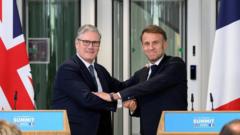Can Starmer and Macron Inspire Patience in Our Impatient World?

Political Dynamics: Navigating the Challenges of Leadership in France and the UK
Observing the political landscape in France and the UK reveals a gripping narrative of leadership under pressure. The recent news conference featuring Sir Keir Starmer and President Emmanuel Macron showcased two leaders grappling with declining approval ratings, each striving to defend the tenets of their political ideologies. As they face increasing scrutiny from the electorate, the question arises: how do these leaders advocate for patience, nuance, and compromise in an age characterized by an appetite for swift solutions and decisive action? This article delves into the intricacies of their political strategies, the challenges posed by rising populism, and the implications for their respective parties and countries.
The Political Climate: A Study in Contrast
The political environment in both nations is simmering with discontent, fueled by the emergence of populist movements that challenge traditional political norms. Although Reform UK and National Rally are distinct entities, they share a common ability to resonate with disenchanted voters. Both parties capitalize on a sentiment of anti-establishment fervor, employing straightforward language to articulate their messages. This approach has proven effective in a time when many citizens feel marginalized by the conventional political elite.
Prime Minister Boris Johnson’s remarks at the news conference highlighted the necessity of pragmatic politics. He emphasized the importance of moving beyond mere rhetoric to deliver tangible results for the populace. This assertion implicitly critiques the populist leaders who often resort to oversimplified solutions for complex issues. The contrast between Johnson’s call for patience and the populist rhetoric of immediate change underscores the profound divide in the current political discourse.
Populism’s Grip on the Electorate
The rise of populist parties like Reform UK and National Rally poses a significant threat to the established political order. These parties have effectively tapped into the frustrations of voters who feel that mainstream politicians have failed to address their concerns. With leaders like Nigel Farage and Marine Le Pen at the helm, these movements advocate for radical changes, often positioning themselves as champions of the people against a perceived elite.
Farage’s recent statements, including his criticism of the UK government’s new deal with France, illustrate the populist strategy of framing traditional politics as ineffective. By suggesting that the UK abandon the European Convention on Human Rights, Farage positions Reform UK as a radical alternative capable of breaking free from the constraints of traditional governance. This narrative resonates with voters yearning for change, creating a fertile ground for populism to thrive.
Strategic Responses from Starmer and Macron
In response to the growing threat of populism, both Starmer and Macron are attempting to redefine their political messaging. Starmer’s efforts to reclaim disenchanted Labour voters hinge on demonstrating that the party can address pressing issues like immigration and public services with a pragmatic, reform-oriented approach. New polling data indicates that a significant proportion of Labour voters who have shifted to Reform UK are open to returning if they perceive a tangible improvement in the situation regarding small boat crossings, a contentious issue in UK politics.
Macron, facing similar challenges in France, emphasizes the need to acknowledge the complexities of contemporary governance. His critique of populist leaders as offering false promises resonates with voters who may feel disillusioned by the simplicity of their proposals. Macron’s argument is grounded in a belief that effective governance requires navigating intricate societal issues rather than succumbing to the allure of quick fixes.
The Balancing Act of Leadership
Both leaders find themselves in a precarious balancing act: they must advocate for patience and thoughtful governance while simultaneously addressing the immediate concerns of their constituents. The pressure to produce results can be overwhelming, especially when the electorate is quick to judge the effectiveness of government actions. Starmer’s and Macron’s challenges are exacerbated by the reality that the electorate’s patience is dwindling. They must demonstrate that their approaches can yield meaningful change without resorting to the populist tactics that many voters seem to crave.
Lessons from Historical Precedents
Historical precedents suggest that leaders who fail to adapt to the shifting political landscape risk losing their grip on power. The emergence of populism in various forms across Europe provides a cautionary tale for established parties. The lessons learned from previous electoral cycles reveal that voters are increasingly willing to embrace unorthodox candidates who promise to shake up the status quo, even if it means veering away from traditional political ideologies.
For Starmer and Macron, the stakes are high. Both leaders must navigate an environment where public sentiment can shift rapidly, often in response to perceived governmental failures. Their ability to articulate a vision that resonates with voters while maintaining a sense of calm and resilience will be crucial in the coming years.
The Future of Governance in an Era of Discontent
The evolving political landscape in both France and the UK raises important questions about the future of governance. As populist movements gain traction, established political parties must reevaluate their strategies to remain relevant. The fear among political insiders is that if populist parties like Reform UK gain significant ground, the implications could be profound. There is a growing concern that these parties may not only win elections but also struggle to deliver on their promises, leading to a cycle of disillusionment and further political instability.
The potential for Reform UK to capitalize on the perceived failures of both major parties presents a unique challenge. Political figures from both Labour and Conservative parties have expressed apprehension about the implications of a potential Reform UK victory. The possibility that this party could be viewed as a viable alternative threatens to reshape the political landscape in unpredictable ways.
What Lies Ahead: A Call for Reflection
As Starmer and Macron continue to navigate the tumultuous waters of contemporary politics, their success will depend on their ability to engage with voters on a deeper level. The electorate is increasingly demanding transparency, accountability, and meaningful change. The leaders must rise to the occasion by not only addressing the immediate concerns of their constituents but also by fostering a sense of hope for the future.
The challenge lies in convincing voters that patience and nuanced governance are essential for long-term success. Starmer and Macron must articulate a vision that resonates with the electorate’s desires for change while also addressing the complexities of governance in a rapidly evolving world. Their ability to navigate this delicate balance will be pivotal in shaping the future of their respective nations.
FAQs
What is the significance of the recent news conference between Sir Keir Starmer and Emmanuel Macron?
The news conference highlighted the challenges both leaders face in addressing public discontent and the rise of populism. It underscored their commitment to advocating for pragmatic, nuanced governance in an increasingly impatient political climate.
How are populist movements affecting traditional political parties?
Populist movements are challenging traditional parties by appealing to disenchanted voters who feel that mainstream politicians have failed to address their concerns. This has forced established parties to reevaluate their strategies and messaging to remain relevant.
What challenges do Starmer and Macron face in their leadership roles?
Both leaders must navigate a political landscape characterized by growing impatience among voters. They face pressure to deliver immediate results while advocating for a more thoughtful and nuanced approach to governance.
As we reflect on the current political climate, it is essential to consider the implications of rising populism and the responses of established leaders. How will the political narrative evolve, and what strategies will leaders adopt to regain the trust of their constituents? The future of governance in both France and the UK hangs in the balance, and the coming years will undoubtedly shape the trajectory of political discourse for generations to come. #Politics #Leadership #Populism
Published: 2025-08-01 17:16:17 | Category: sport



